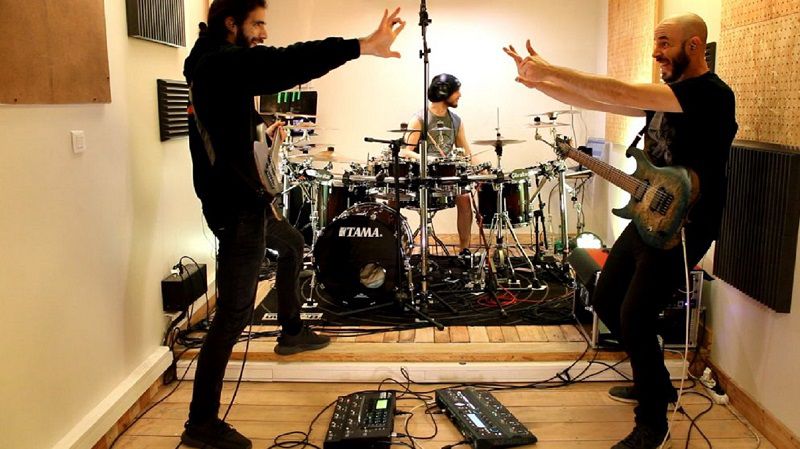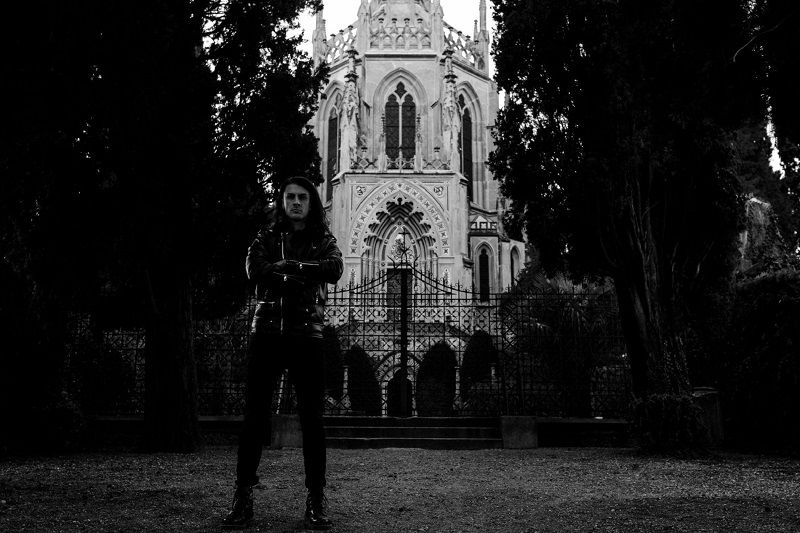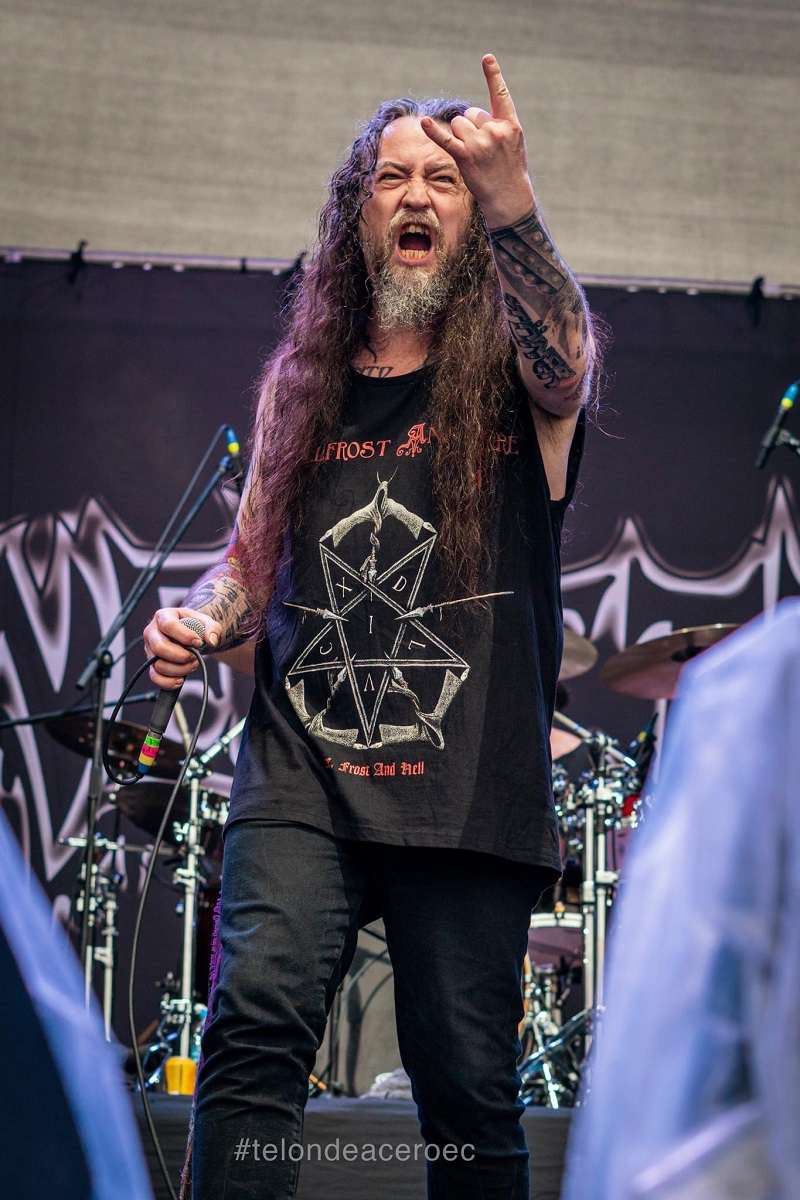Vulcano Interview
9 min read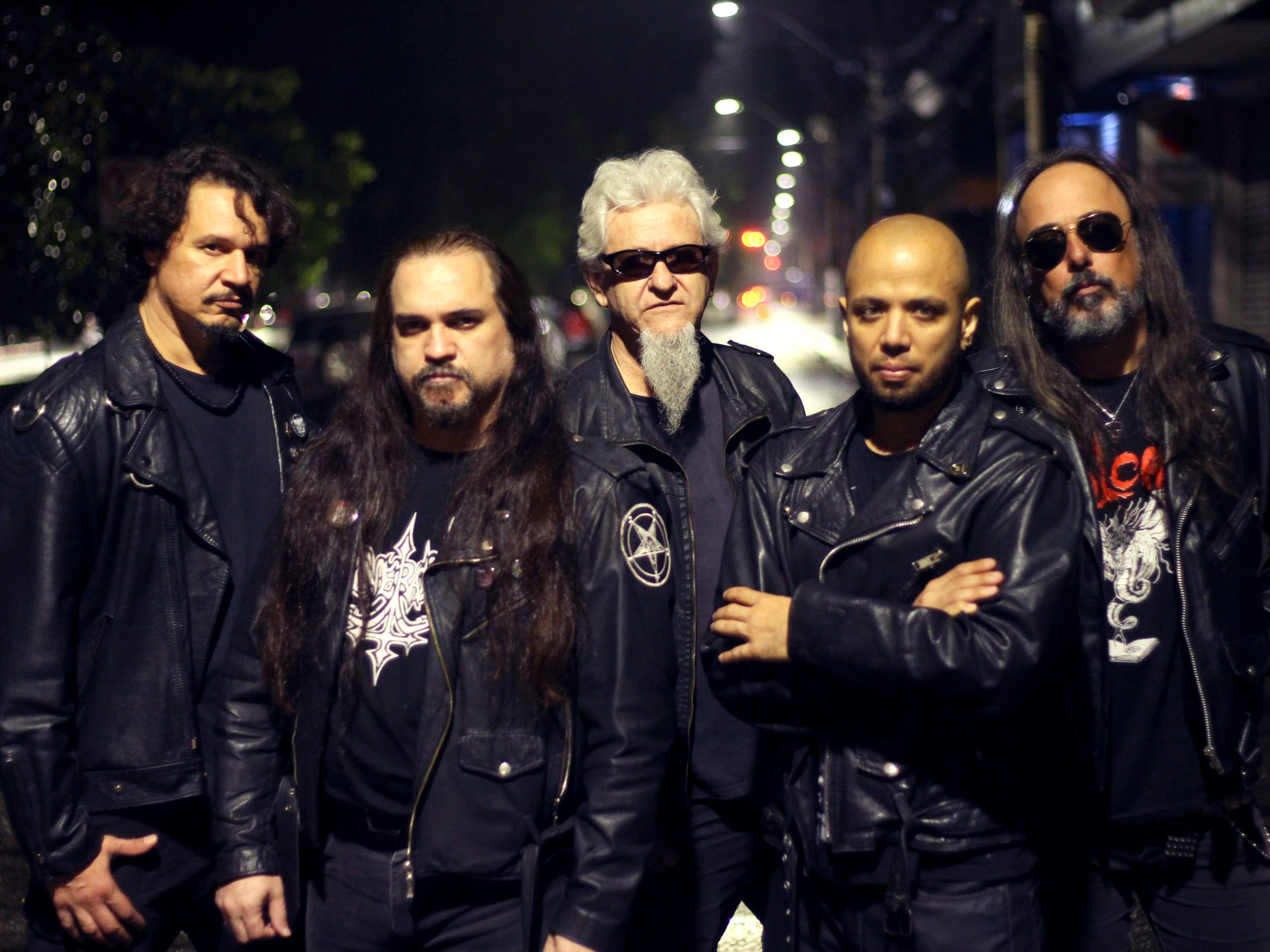
Age Ain’t Nothin’ But A Number
After nearly 40 years of thrash and black metal and ahead of Vulcano’s new album, Eye In Hell, sole founding member Zhema Rodero discusses his band’s influence and career as they erupt from the South American underground.
by Justin Smulison
The music of Vulcano has been an undeniable influence on the extreme metal underground. They were among the very first bands to establish trash and black metal in Sao Paulo, Brazil back in 1981, and their sound tapped into a primal urge which reflected an equally grim social and political climate that extended beyond Brazil into many South American and Latin American countries.
Led by guitarist and songwriter Zhema Rodero, Vulcano has always prided themselves on their do-it-yourself approach to all facets of the music business—from writing and recording to performing, distributing and promoting. In many respects they had no choice but to operate that way, as their sound was atypical for the region, though the thrash scene was catching on in Europe and North America at the time. Vulcano’s live shows thrived in an underground that was taking shape and it was during those riotous tours in the early 1980s that they released and circulated demo tapes that grew their fanbase (among whom was very likely a young Max and Igor Cavalera, and we all know how things turned out for them).
Vulcano released their first studio album, “Bloody Vengeance” in 1986, which is considered essential genre and underground listening. The band churned out three more albums (all on very small labels) all while touring and amid frequent lineup changes. Following the release of the aptly-titled “Ratrace” in 1990, Vulcano took a long break from new studio album recording, though they played some live shows. They returned with the dark and crushing “Tales From The Black Book” in 2004 and, under the Rodero’s leadership and direction, have had a steady output ever since.
Their new album, “Eye In Hell”, will be available worldwide on March 13 via SPV and Mighty Music. Produced by Rodero and former bassist and longtime producer Ivan Pelliciotti in O Beco studios, in Curitiba, Brazil, “Eye In Hell”has 13 tracks featuring all the hallmarks of Vulcano’s trailblazing black metal sound. While some bands don’t want to pummel their audience, Vulcano knows no other way and goes for the jugular with every song. Check out “Bride Of Satan,” the album opener for proof.
For Eye’s lineup, Rodero is joined in Vulcano by singer Luiz Carlos Louzada (who has sung on every studio album since 2010), bassist Carlos Diaz, guitarist Gerson Fajardo and newest member, drummer Bruno Conrado who joined in 2019.
Blessed Altar Zine contributor Justin Smulison caught up with Rodero to discuss the wild ride that is his career, how he keeps in touch with fans, why a hiatus was ultimately good for Vulcano’s music and how he can spot a true member of the underground scene.
Justin Smulison: Vulcano is approaching its 40th year as a unit. What is your reaction to that milestone? And could you have envisioned the band remaining active for this long?
Zhema Rodero: The perception we have of time is very relative. For example, only when you can no longer do something that was very easy for you, then you realize that the years have passed. I’m not banging my head like I did 30 years ago, but I have the same emotion when I’m on stage. Despite my short and grey hair nowadays, I’m the same Zhema from 1980s, [who had] long and brown hair. I know it’s a long time for an underground band to be alive, maybe this is the main reason Vulcano still exists; to do what [you] love is a secret for a long existence. I never thought Vulcano would [last] 40 years, as I don’t think from 50, but nobody knows.
Aside from the personnel changes, what are some of the biggest changes—positive, negative, or otherwise—that Vulcano has experienced?
The main changes that have occurred in the band are imperceptible to those who follow us or listen to our music, because we have changed as people. We have jobs, families, responsibilities and bills to pay, so we are different from what we were once. This is the main change and it is obviously positive. I don’t see anything negative that may have happened! How did this influence Vulcano? It made us more comfortable to do what we want because we don’t have a slave commitment to always be among the Top 20 albums or spend a lot of months away from home, etc.
I don’t try to make “adult metal” full of techniques, virtuosity, messages and visual effects, I just want to continue doing what we did in the 1980s and I am sure that tons of fans want this, too.
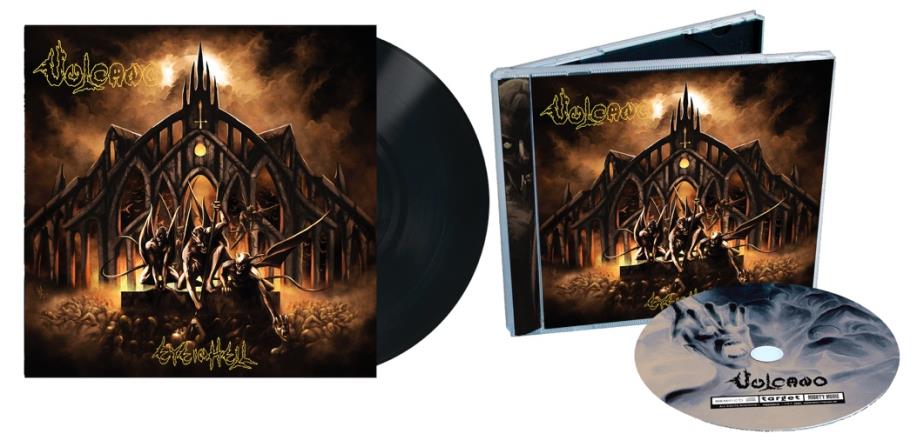
What is it like to know that you are considered the champions of the Brazilian underground metal scene?
The Brazilian underground metal scene is so big, …and has a continental territory and a great diversity of cultures, but when you are speaking about the “underground metal scene” there’s no difference. We are all speaking the same language, and it’s very good! I don’t think Vulcano are the kings of the Brazilian underground. No, no, no. But we are respected for our legacy, and for example as a band and as people. There is no hierarchy in the underground; we are all the same, so that’s the secret!
What was the scene like when you began in the 1980s? How was it unique from other countries in South America and internationally? How did it change, evolve or improve over time?
This is the most difficult question to answer, because everything was different, everything you can imagine was different—there was no streaming platform, there was no YouTube, there was no mp3, there was no digital music, there was no CD, there was no internet , there was no ultra-fast communication, there was no availability of musical instruments, equipment, amplifiers, recording studios, technicians and sound engineers. Nothing!
But there were enthusiastic fans, vinyl LPs, cassette tapes, a pen, a sheet of paper, post offices and the wait.
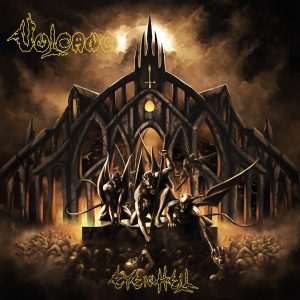 Vulcano was one of many metal bands that took an extended break beginning in the 1990s. Did you find that demand for your music increased while you were on hiatus?
Vulcano was one of many metal bands that took an extended break beginning in the 1990s. Did you find that demand for your music increased while you were on hiatus?
I think so! In the 1990s, the bands of “thrash metal” emerged, which 10 years later would become the “metal streaming scene” and with them they brought a younger audience born in the 1990s.
What were your members doing during that interim period?
The guys of Vulcano went to university and took care of our families. [Former drummer] Arthur [Von Barbarian] created a music school, [former singer] Lauder Piloni Angel a tattoo studio and Fernando Levine went to teach biology classes.
Had you always intended Eye In Hell to be the album to follow The Awakening of an Ancient and Wicked Soul?
Well, here we are talking about two very different things. The Awakening of an Ancient and Wicked Soul is a 2013 EP that I wrote to be a side project to the album Wholly Wicked, and both were released at the same time, but the EP only on digital media. That EP has a totally different proposal, in fact it is a trilogy of three short stories [written] under a theme usually addressed in the Mystery Schools. So I wrote a soundtrack for that. It is very different from what I usually compose at Vulcano.
After those releases, we still released a double-live album and the album XIV. All three of these albums keep a central theme, and they don’t mix, however Eye in Hell doesn’t have that! Each song has its own theme that begins and ends in itself.
You signed a two-album deal with Mighty Music, with Eye In Hell marking the first outing. What can longtime fans expect from this collaboration?
Old fans will receive a great quality graphic and phonographic production, in addition to having access to the album at a lower cost. On the other hand, Vulcano also wins because our album will arrive in places it has never been before. We will have an opportunity to show our music to those who only know us by name.
How refreshing was it to be able to change the recording and production dynamic?
Referring to the production of this last album, I can say that I was consulted about my opinion during the whole process of building the cover, layout, choice of songs, colors to be used, even press releases. Nothing was made without my opinion. Everything works well!
What are some new songs you are looking forward to playing live?
On our last European tour we were already playing “Evil Empire” but our intention is to add three or four more to the setlist. However I must say that whenever we release a new album we put four or five songs from it on the setlist, but we rarely get to play all of them on the same gig because most fans want to hear our old songs. It’s tough! At least three songs from each of our last two albums we’ll keep on the setlist.
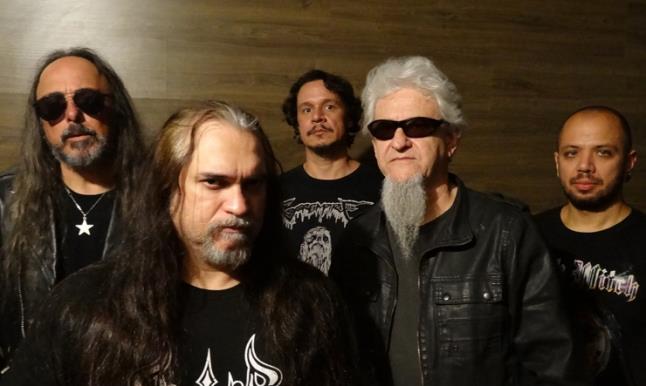
You have a lot of songs about hell, its landlord and its inhabitants. Why do you feel your fans—and many metalheads around the world—are continually intrigued by hell and the underworld?
When I’m talking about hell, I’m not necessarily referring to the one the bible told us of. For example, the word “hell” expresses some abstract concepts such as something wrong, heat, actions that did not materialize as someone wanted, etc. Our song, “Seven Seconds in Hell” is not referring to Hades, or to the bible that destined the wicked, but it’s referring to the [bombing] of Hiroshima.
When composing, do your lyrics or themes drive the music? Or does the music come first?
Usually I have the lyrics first. I usually write several phrases and save them and from them I write a text, which later becomes a song lyric and then I compose a song for that lyric. But for Eye in Hell I did it differently. I first wrote all the songs and then I wrote the lyrics for each song, because they do not have a central theme through which ideas flow.
Tell me about the song, “Sinister Road.” What inspired its lyrics?
“Sinister Road” is an allegory about heroin and opioids in general, cocaine and crack. It’s a road without return, nor exit.
You mentioned the influence of technology, earlier. How has the internet and social media added to your fanbase?
Nowadays I don’t write any more letters, even messages via email, it seems that nobody else does that kind of thing. Most of the information comes to me via Facebook or Whatsapp.
That’s how I know what’s happening with Vulcano, through these media besides YouTube, Spotify, Apple Music, and something like that, I find out where the fanbase is, how they reacted to our last show, etc.
What other directions or sounds might you explore on your next album?
I really don’t know! It will depend on what I’ll do when the time arrives. I don’t worry in advance about having a preconceived idea of what direction I’m going to take, even because I only know to do what I’ve learned. I will never take a chance on a path that I don’t know and the path that I know is 1980s death and black metal. So that’s probably what I will do.
Blessed Altar Zine was founded in support of underground artists. What are some of the most important lessons you learned over the years?
I learned that there will always be different people, on the one hand, those who understand the underground scene as much as the mainstream scene; and on the other, the people who only understand mainstream. That’s the difference!
—Interview by Justin Smulison
Band
Bandcamp
Website
Youtube
Facebook
Spotify
Instagram
Twitter
**Please support the underground! It’s vital to the future of our genre.
#WeAreBlessedAltarZine
#TheZineSupportingTheUnderground

